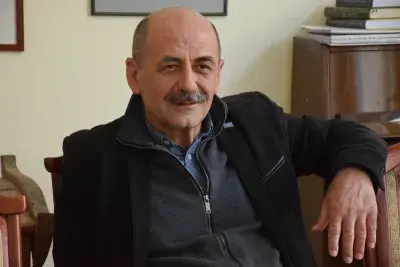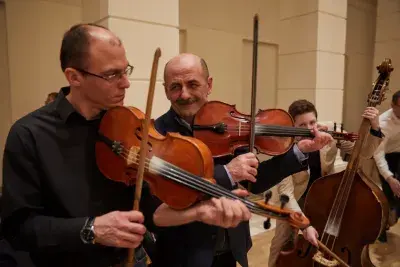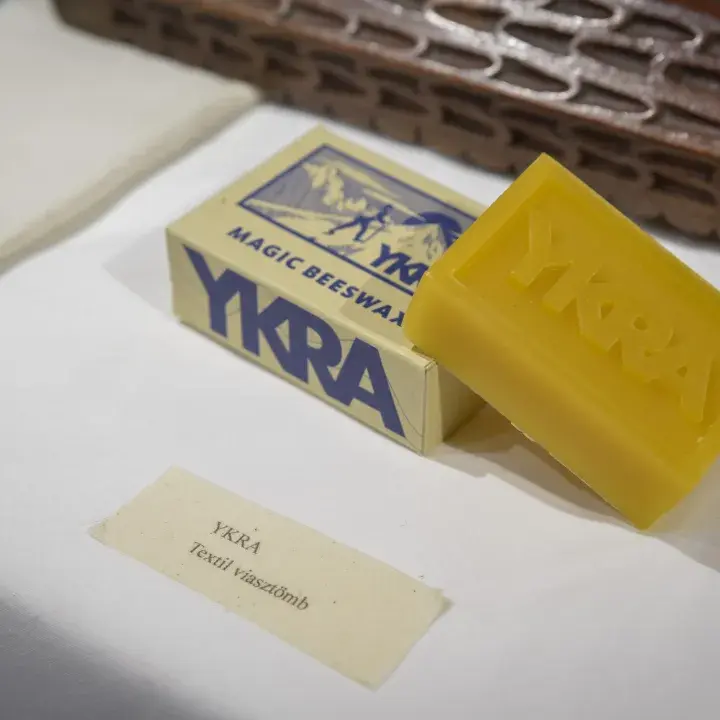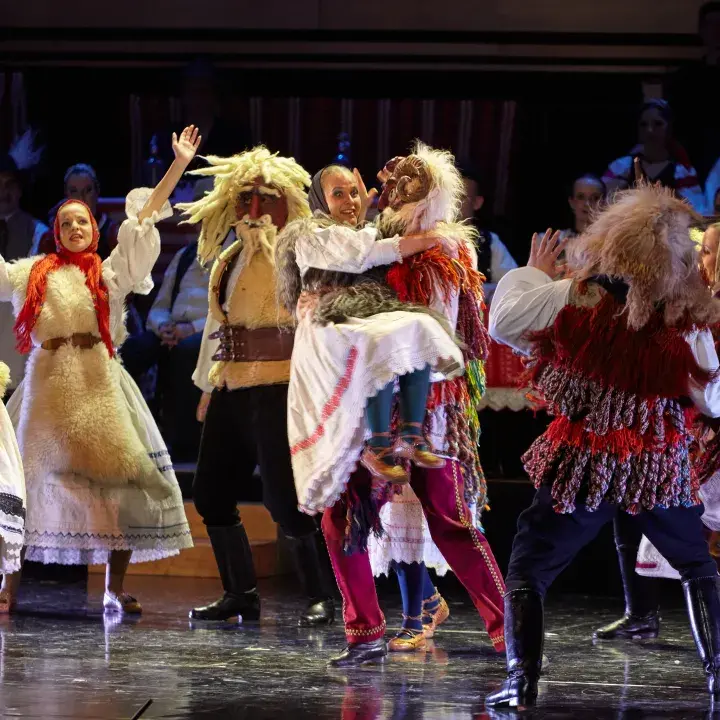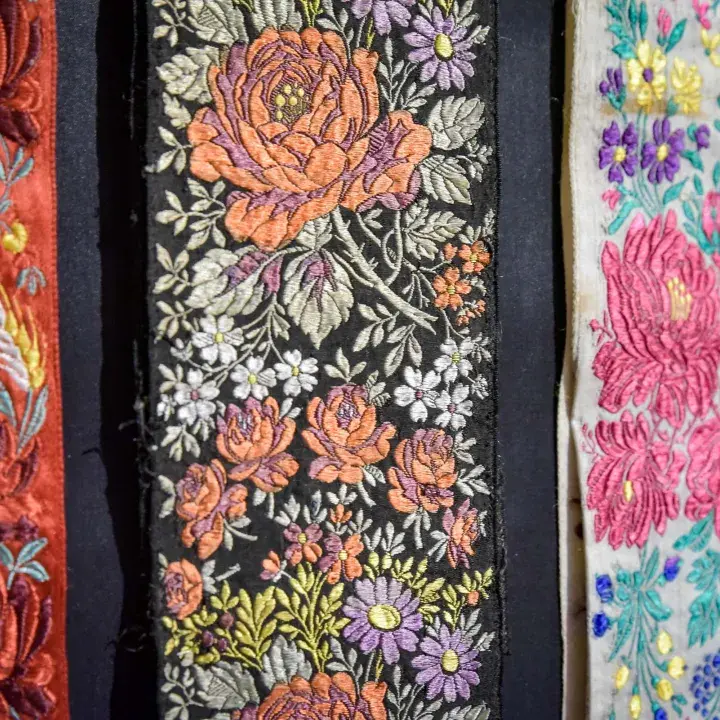László Kelemen, Director of the Hungarian Heritage House, composer, laureate of the László Lajtha and Ferenc Erkel Awards, folk musician, an outstanding figure of the Transylvanian and Hungarian dance house movements and tutor of many young folk musicians, celebrated his 60th birthday on May 1 2020. Though serving the last year and a half of his tenure at the Hungarian Heritage House, his work is far from over - as preserving and passing on the values of folk culture constitutes the essence of his being.
László Kelemen was born in Gyergyóditró (Transylvania) on May 1, 1960. He graduated from secondary school in Marosvásárhely in 1979, and continued his studies in Composing at the G. Dima Music Academy in Kolozsvár. Aside from composing, he collected and performed Transylvanian vocal and instrumental pieces, and also became a member of Bodzafa, one of the legendary bands of the Transylvanian dance house movement.
Escaping from the Ceausescu regime, he fled to Hungary in 1986. Between 1986 and 1992, he worked as the musical editor of Budapesti Zeneműkiadó; afterwards, together with Csaba Ökrös, Miklós Molnár, Gyula Kozma and András Berecz, he became a founding member of the Ökrös band, the iconic ensemble of authentic folk music, and joined them on numerous worldwide tour series. Along with the band, László Kelemen became on of the first laureates of the Hungarian Arts Award (Magyar Művészetért-díj) and the Young Master of Folk Music Award.
Serving as Director of the Hungarian Heritage House until November 2021, You shall leave the institution after leading it for 20 years. During this period, the House has successfully endured difficult times, laying down the foundations for preserving and disseminating the values of cultural heritage among the urban generation of today. Despite boasting such experience, perhaps nobody could have prepared for the pandemic we are living through; on the other hand, the restart strategy that is essential for survival, as well as preservation of created values, needs to be planned carefully. How do You assess the upcoming times, the short-term future for artists of traditional culture and folk music, and the destiny of the Hungarian Heritage House during this curious “reincarnation”?
First of all, I believe the time has come to provide immediate help. We shall offer quick assistance to independent musicians who have lost their jobs and income. In this regard and using its own funds, the Hungarian Heritage House has also published a call for bids; I am currently negotiating with the Ministry to launch a much larger project of 150-200 million HUF in the next round. Naturally, our objective is to survive; should our situation improve, we shall then strive to preserve our functions. It’s like cancer for our societies. This situation feels like death, as personal interaction is an essential feature of traditional culture. Relaxing the restrictions will determine our next steps. We are currently working on developing a well-functioning Virtual Hungarian Heritage House; this project, named FolkStudio, should be launched on May 10, the Dance House Day. FolkStudio shall feature performers, bands, solo artists and dancers, not only offering them a chance to perform and earn a salary, but also allow us - as a precautionary measure - to produce a large database and a significant volume of recordings, which shall serve methodical and artistic purposes in the future. Unfortunately, our life within the Hungarian Heritage House will not be the same either until a vaccine or medicine against the virus becomes widely available, given that in folk dance, there is no such thing as a distance of two meters - and even the Hungarian State Folk Ensemble cannot escape the threat of infection. Naturally, there are forced solutions - for instance, I am working on dividing the ensemble into two smaller groups; but in general, frequent testing would be the most beneficial for us. Apart from that, we are trying to establish a multipurpose outdoor venue on Corvin Square, where we could organize dance house events or programs for children. Our goal is to carry on the work that was suddenly cut in half by the virus. During the 20-year-history of the Hungarian Heritage House, I have seen it all; we have been pushed to the brink of collapse or were barely scraping by several times. However, our hard work seems to have paid off, with the House showing very decent results recently. I did not see the current situation coming, that I would have to lead a fight against a pandemic at the dawn of my career; it is hard for me personally as well, mostly because I cannot travel home to Transylvania. Back in 1987, when I first relocated to Hungary, they did not let me go back for my grandfather’s funeral. This feels exactly the same, only the circumstances are different. In this context, I have recognized something in relation to my life and the Hungarian Heritage House: I do not have two homes - Hungary is my home, just as much as Transylvania is. As our poet, László Király once said: “The home, it is I”.
As You mentioned, speed is of the essence in stabilizing such critical situations. That reminds me of the 1997 collection series called The Last Hour (Utolsó óra), initiated and led by Yourself, in which time and complex planning also played a crucial role.
In every situation affected by restrictions or limitations, details must be closely scrutinized; if we fail to consider all the possible aspects, we can easily be surprised by unexpected events. And that may even cost lives. At the same time, it is important to keep our faith in the integrity of our actions, and hope for a better tomorrow. I believe that in our field, we embrace this mentality.
What were Your feelings and objectives when You were appointed Director? Have You foreseen any of the milestones achieved by now?
Naturally, I had a thousand visions, even though I could not see twenty years in advance. I belong to the lucky ones blessed with visions - and the concept for the Hungarian Heritage House was already conceived. Ferenc Sebő, the newly appointed director of the Hungarian State Folk Ensemble, proposed that we start working on establishing the institute. That’s how it all began, with me, the rookie, being appointed its leader. I did not have the ambition to become Director, but, alas, it was perhaps God’s will...
After all this time, how would You evaluate the development process of the dance house and folk music community?
Once you get to know this world, you will cherish the experience for the rest of your life. The question is: how do we attract new generations to join us? Nowadays, folk music and folk dance may be taught anywhere; but that’s not the issue here. That’s only the consequence. The most important part is for young people to experience this culture in an enjoyable way. The dance house community plays a crucial role in this; elsewhere, visiting the countryside also helps a lot, even if we don’t get to meet the so-called collectors there. As Bartók said, the village atmosphere, the rural life and the way of nature has such an impact that we develop a craving for it. For me, visiting the countryside feels like returning to paradise lost. Way back when starting out, we were constantly feeling the need to improve; fortunately, this no longer applies to the dance house community today. I had a vision that just like The Rolling Stones or Queen, we would also be standing in front of thousands of people on stage, with me playing the viola, living the perfect life. But in fact, I had to realize that this culture is not made for that - on the contrary, our target audience and followers are close-knit communities of 50 to 100 people, that will directly respond to our call and carry on our legacy. This does not mean that we could never attract thousands of people on a festive occasion; however, the everyday concert and performance experience in our field is not like that. This style is passed on from person to the next person, as close contact speaks louder than any amplifier. Our objective is to become such a significant pillar of the Hungarian cultural scene, that will ensure the survival and ongoing cultivation of this style. I’m saying this because should this civilization once collapse due to any reason, this field shall possess all the knowledge, for instance the proper use of herbs or production of soap, necessary for its survival. The mastery of all these crafts may one day become essential for humanity, should we be struck by a catastrophy - and that’s why we should pass on such knowledge to the largest possible extent.
What’s Your inspiration and motivation to stand Your ground under any circumstances?
God is my refuge. He is my hope. He gives me the power to live and work. It is also the legacy of my great-grandparents, grandparents and parents, who may be long gone, but lived in culture, and introduced me to its beauty when I was a child. And, of course, the desire to leave something behind that will make a difference in the world. I feel like a worm: I’m digging through whatever soil I see ahead.
Why did You become interested in folk music back then?
It was the heartfelt authenticity in the singing of my grandfather, who expressed his life and put his soul at ease through the lyrics. That’s what led me down this road. Every higher standard of culture we rise up to makes us better; it’s in all of us, we just need to find it in ourselves.
Have You witnessed that many people struggle to find this voice within, and have a difficult time reaching and expressing their inner freedom?
There are so many people like that, not even I could do so all the time...It’s also a matter of artistic and personality differences. I see so many people who are afraid to join a dance house routine, even though they would love to. But we all need to take those first steps towards happiness and spiritual improvement. The pandemic has now shown how desperate the world would be without culture. It is also clearly apparent that surrogate or complementary sources of culture accessible over the Internet are only a temporary fix. Virtual reality cannot substitute the real world in the long run.
What is the activity You miss the most right now, and look forward to picking up again?
I would like to devote more attention to composing. Following in the footsteps of Bartók, it was my dream to study and master all the fields of folk music for 20 years, create my own composing style, and compose music for the next 20 years. The latter 20 years never came, as I had to devote all my energy to the Hungarian Heritage House. However, I would like to stress that I do not wish to focus on what I’ve missed out on; instead, I would like make my goals and dreams come true. In this regard, I consider it a great honour that the Music Academy will host a grand concert dedicated to myself on October 8. After that, I will be in charge of the New Year’s Eve Concert. As You can see, there is plenty of work to do, and seeing it all through gives me great pride and joy.
I’m sure You also have plans for when You definitely cease Your career at the Hungarian Heritage House.
My tenure lasts until November 2021, but I will only reach the retirement age of 65 in 2025. Until then, I would like to preside over the Transylvanian Heritage House established last year. In the meanwhile, I also hope to train and designate my successor in the (Hungarian Heritage) House. Naturally, I would like to pass on all my previous experience to him/her, and remain ready to help whenever needed. However, after 2025, the only thing I would like to do is teach. For this reason, I have recently enrolled in the graduate program of the Music Academy. I need this degree to be able to teach back in Romania. In the meanwhile, it would also be nice to establish an instrumental folk music department upon returning to Transylvania.
What would You wish Yourself for Your birthday?
I wish for the pandemic to end as soon as possible. That’s not only a wish - I pray for that.

